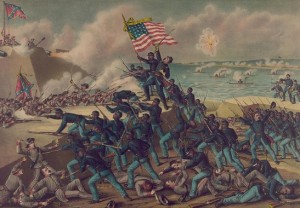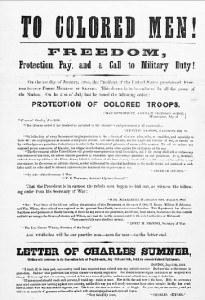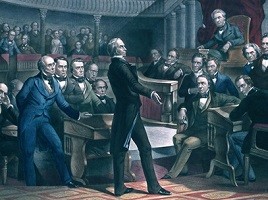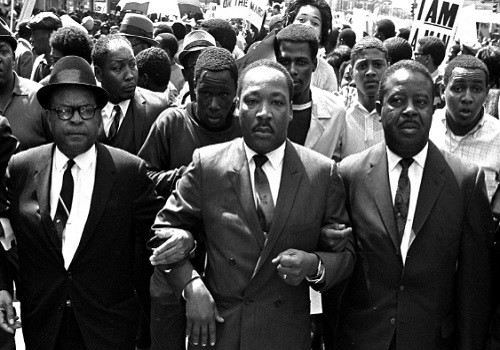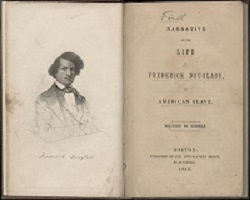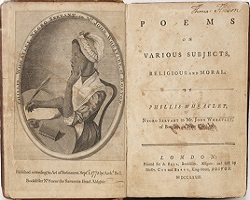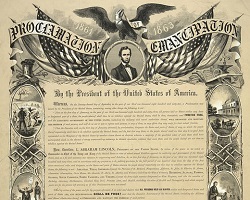African American Civil War Soldiers
Following Abraham Lincoln’s election, South Carolina passed an Ordinance of Secession in December 1860. The President struggled to keep the country together as other states declared sovereignty as the Confederate States of America. On April 13, 1861 Lincoln responded to the Fort Sumter rebellion, north and south were at war.
Lincoln entered the war without the intention of freeing slaves, restoring the Union was his main goal. Yet, abolitionists supported the war and African Americans were enthusiastic and determined to bring the south to defeat and end slavery in the region. Abolitionists believed that if African Americas were given the opportunity to serve as soldiers they would be given the right to citizenship.
“To fight for the Government in this tremendous war is, than to fight for nationality and for a place with all other classes of our fellow-citizens”
Frederick Douglass, “Another Word to Colored Men”.
The 54th Regiment Massachusetts Volunteer Infantry at Battery Wagner, a Confederate fort on Morris Island at Charleston, July 18, 1863.
Lincoln called for volunteers to join the Army. In the north patriotism was at all time high. In Philadelphia, within a month, 90,000 male volunteers had signed up to join the Army. In Pittsburgh, a group of African Americans had formed the Hannibal Guards and others throughout the north were willing to enroll in military units. However, African Americans were prohibited to join the ranks as a Federal Law, dating back from 1792, barred them from bearing arms in the US Army.
Many black leaders such as Frederick Douglass, Jermain Loguen and William Wells Brown advocated for black soldiers to enlist in the Army. Douglass wrote a number of articles in his newspaper, letters to political leaders and met with President Lincoln.
To Lincoln, authorizing colored people to join the Army would have been a trigger for border states to secede. But by mid 1862 enrollment of white volunteers was declining and there was a pressing need of personnel. Finally, on January 1st, 1863 the Emancipation Proclamation was announced. It declared African American slaves free and that military and naval authorities will recognize and maintain their freedom. However, the Proclamation fell short of declaring them citizens. The Proclamation called African Americans to service.
“…such persons of suitable condition will be received into the armed service of the U.S. to garrison forts, positions, stations and other places, and to man vessels of all sorts in said service”
Emancipation Proclamation, 1863, Abraham Lincoln.
In May 1803 the U.S War Department issued General Order Number 143 that established the “Bureau of Colored Troops” to administer the recruitment of African Americans soldiers. African American leaders encouraged black men to join the ranks of the Union Army.
They tell you this is the “white man’s war”; that you will be “no better off after than before the war”; that the getting of you into the army is to “sacrifice you on the first opportunity.” Believe them not; cowards themselves, they do not wish to have their cowardice shamed by your brave example.
Frederick Douglass, Men of Color to Arms!
One of the first official colored regiments was the 1st South Carolina Volunteers and the 54th Regiment Massachusetts Volunteer Infantry. Frederick Douglass’ two sons, Charles and Lewis, and Sojourner Truth’s grandson were one of the first men to enroll. Women were not allowed to join the Army, nevertheless they served as nurses and cooks; the most famous being Harriet Tubman who selflessly served also as a spy and scout.
As African American soldiers faced discrimination, black leaders advocated for equal pay and POW treatment.
African Americans faced many discriminatory practices in the Union Army. All troops were commanded by white officers. At the beginning of their enlistment colored soldiers were paid less than their white counterparts. African Americans got paid $10 a month with a deduction of $3 for the cost of uniforms. White soldiers were paid $13 a month with no deduction for uniforms. The Union gradually realized their importance and with the advocacy of their leaders, in June 1864 their salary was leveled and paid retroactively. African American leaders also pursued the humane treatment of African American prisoners of war (POW). President Lincoln threatened reprisal of Confederate POW for the mistreatment of African American troops.
African Americans served in 175 regiments, more than 179,000 colored people served in the last two years of the Civil War, about 10% of all union troops. Nearly 40,000 died in combat and from illness.
Category: Civil War
